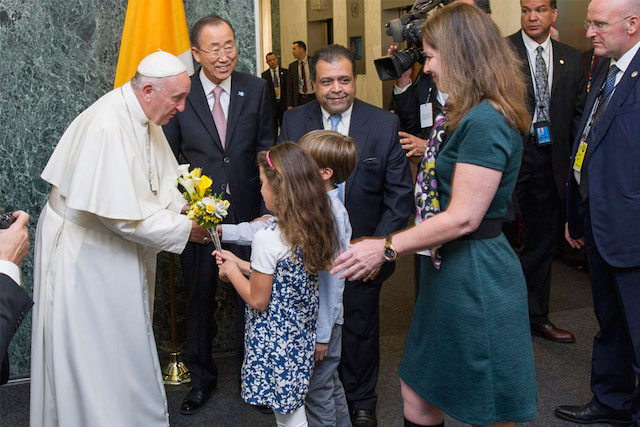By J R Nastranis
Pope Francis – born Jorge Mario Bergoglio in Buenos Aires in 1936 – has been noted in his home country “for his humility, his emphasis on God’s mercy, his concern for the poor, and his commitment to interfaith dialogue”. But in his wide-ranging address at the United Nations General Assembly on September 25, the Argentine pontiff has proved himself the sole world leader, unfettered by parochial interests of any sort whatsoever.
Speaking just ahead of the formal adoption of a new global framework, ‘Transforming Our World: the 2030 Agenda for Sustainable Development,’ composed of 17 goals and 169 targets to wipe out poverty, fight inequality and tackle climate over the next 15 years, Pope Francis endorsed a series of specific economic policies on debt, trade and tax to alleviate poverty.
The Pope’s UN speech followed his address to a joint session of the U.S. Congress on September 24 where he emphasized the need for building bridges to protect the vulnerable and address inequality.
“The Pope just called for responsible lending policies to benefit the vulnerable,” noted Eric LeCompte, executive director of the religious anti-poverty coalition Jubilee USA Network. LeCompte advises the Vatican and the UN on finance and poverty issues. “He’s connecting the failure of austerity and reckless lending policies to poverty and plight,” Le Compte said.
Pope Francis began his speech by calling on international financial institutions to prevent “oppressive lending systems” from harming vulnerable communities. He specifically referenced “usury” – the practice of charging exceptionally high interest rates – as a form of abuse hurting developing countries.
The Pope encouraged the United Nations to use its administrative agencies to address structural poverty issues. This summer, Pope Francis endorsed a UN global bankruptcy process for countries.
“It’s amazing to see Pope Francis talk about usury and the responsibility of creditors,” stated LeCompte. “Pope Francis told the UN that it has a responsibility to use its agencies to solve the debt crisis.”
Pope Francis said: “The present time invites us to give priority to actions which generate new processes in society, so as to bear fruit in significant and positive historical events. We cannot permit ourselves to postpone ‘certain agendas’ for the future.”
“The future demands of us critical and global decisions in the face of world-wide conflicts which increase the number of the excluded and those in need,” he declared.
Pope Francis also warned that the realities in the Middle East and Africa were grave. “I must renew my repeated appeals regarding the painful situation of the entire Middle East, North Africa and other African countries,” he said. “These realities should serve as a grave summons to an examination of conscience on the part of those charged with the conduct of international affairs.”
“Not only in cases of religious or cultural persecution, but in every situation of conflict, as in Ukraine, Syria, Iraq, Libya, South Sudan and the Great Lakes region, real human beings take precedence over partisan interests, however legitimate the latter may be,” he continued. “In wars and conflicts there are individual persons, our brothers and sisters, men and women, young and old, boys and girls who weep, suffer and die.”
Noting the achievements of the UN as it celebrates its 70th anniversary, the Pope said: “The history of this organized community of States is one of important common achievements over a period of unusually fast-paced changes . . . Without claiming to be exhaustive, we can mention the codification and development of international law, the establishment of international norms regarding human rights, advances in humanitarian law, the resolution of numerous conflicts, operations of peace-keeping and reconciliation, and any number of other accomplishments in every area of international activity and endeavour.”
But he cautioned that the experience of the last 70 years had revealed that reform and adaptation to the times were necessary. “The need for greater equity is especially true in the case of those bodies with effective executive capability, such as the Security Council, the financial agencies and the groups or mechanisms specifically created to deal with economic crises,” he said.
Addressing the effects of exclusion and inequality, Pope Francis said the adoption of the 2030 Agenda, was an important step forward, adding that he was confident that the December Conference of States Parties to the UN Framework Convention on Climate Change (UNFCCC), widely referred to as COP 21, would secure fundamental and effective agreements. [IDN-InDepthNews – 26 Sept 2015]


